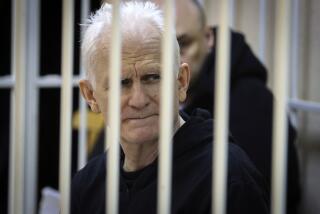Ill Refusenik’s Family Goes on Hunger Strike
- Share via
MOSCOW — Vladimir Apekin’s wife and daughter are engaging in an indefinite hunger strike in the hope that they can persuade the Soviet authorities to let the refusenik leave the country for special medical care.
Apekin, 49, a former marine biologist who was dismissed from his job after he applied to emigrate to Israel, was hospitalized in early March for a variety of ailments, including heart disease.
His family says his most serious problem is a blockage in an artery in his left leg, threatening gangrene poisoning and the possible loss of the leg.
His wife, Katrin Skazkina, said in an interview that an artificial blood vessel could be implanted to bypass the blocked part of the artery. But she said that Soviet doctors have decided against such a procedure, which is not often done in this country, because of Apekin’s weakened condition.
The bypass procedure is done routinely in the West, she said, so she and her daughter, Katya Apekina, 26, are renewing their efforts to get exit visas for the family, including Katya’s 3-year-old daughter, Katusha.
7-Year Effort
They have been trying for seven years to leave the country, and have been refused repeatedly without explanation, Skazkina said, adding: “But now, because of my husband’s health, we are becoming desperate.”
As she spoke, she sipped sugarless tea, the only nourishment she and Katya have taken since April 2. She said they have asked permission to renounce their Soviet citizenship in the hope that this will expedite their departure for Israel.
Since their last application was put in last October--they even paid customs charges for visas, she said--they have heard nothing.
“We are sure,” she said, “that there is only one possibility to save the life and health of my father--to let us emigrate to Israel and get him operated on there. We will be happy if any good hospital in Israel or in another Western country is ready to agree to operate on my father as soon as possible.”
Her mother nodded her agreement. With tears streaming down her face, she was unable to speak for a few moments. Then she said:
“How to know what to do? We don’t know what to do anymore.”
More to Read
Sign up for Essential California
The most important California stories and recommendations in your inbox every morning.
You may occasionally receive promotional content from the Los Angeles Times.










